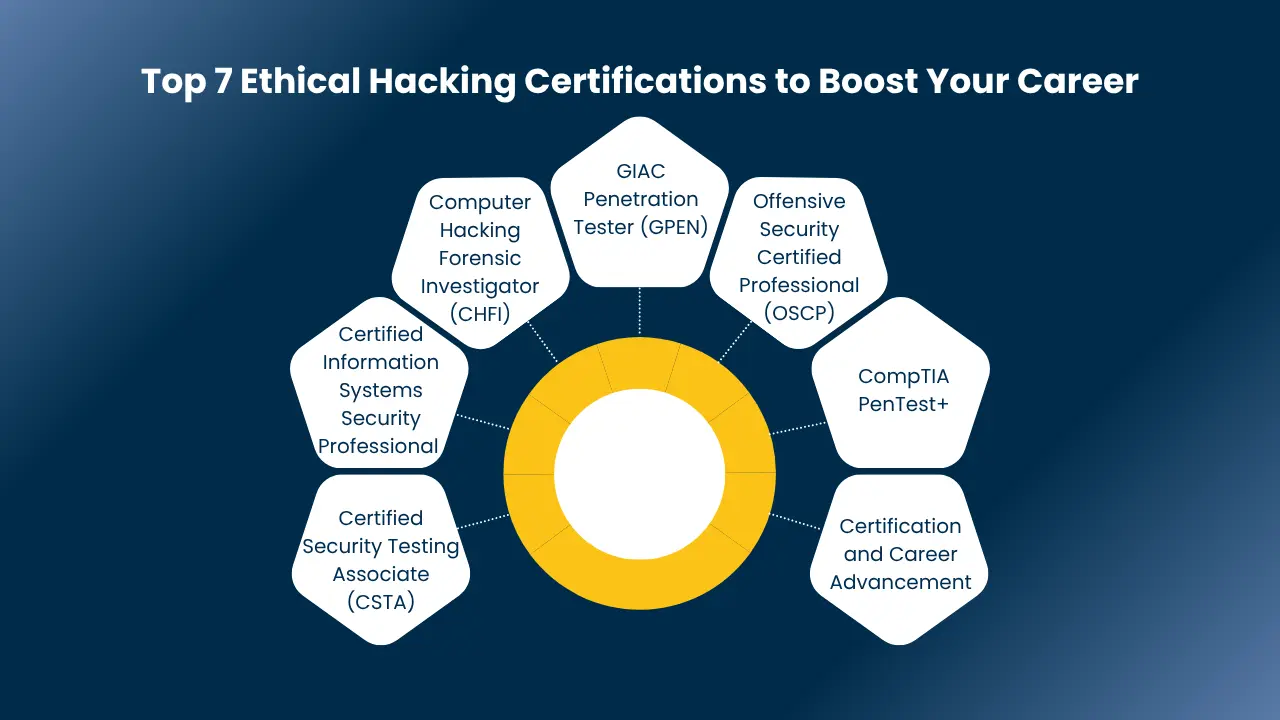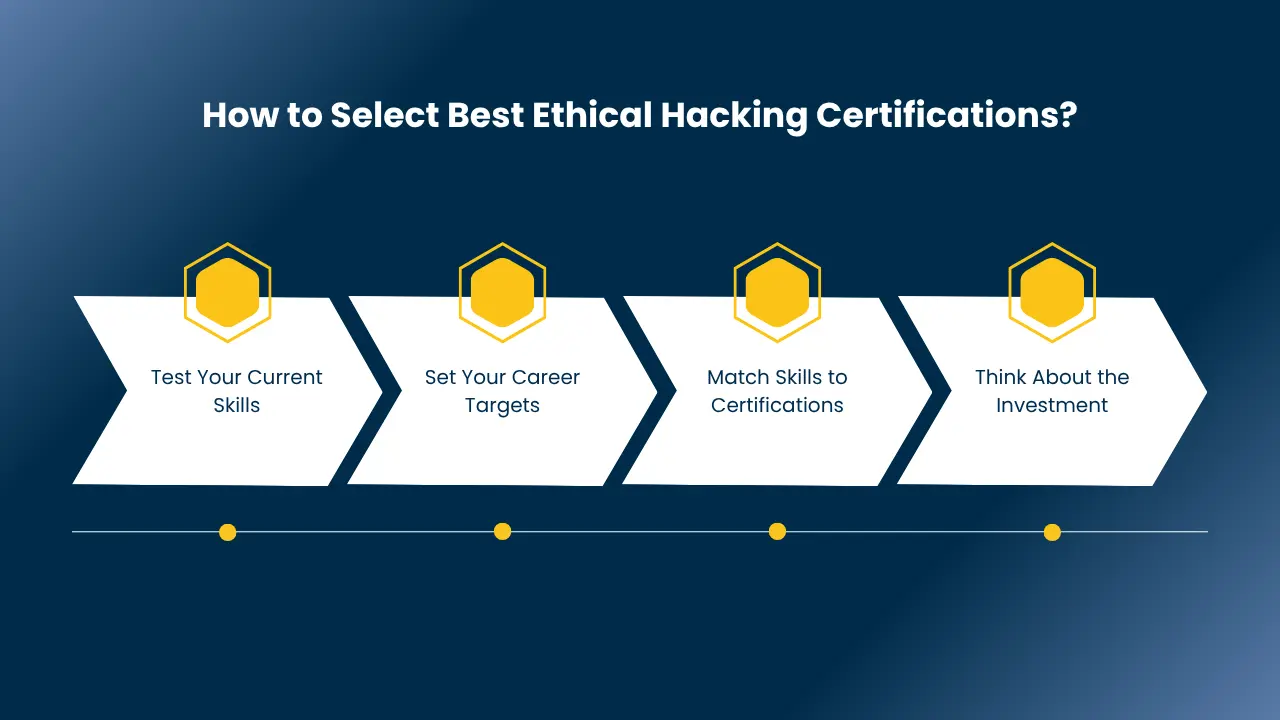With increasing cyber threats, there is also a growing need for qualified professionals capable of thwarting them. Ethical hackers, or “white-hat” hackers, are an essential defense against detecting and patching security flaws before evil hackers do.
In contrast to defensive cyber security, which responds to attacks, ethical hacking is a proactive action that mimics actual cyber attacks. This makes ethical hackers extremely valuable in various industries such as finance, IT, government, and healthcare.
To be the best in this competitive line of work, acquiring Ethical Hacking Certifications is essential. These certifications:
- Demonstrate your cybersecurity expertise
- Enhance your resume and career opportunities
- Make you qualify for good-paying jobs
- Give you confidence in the field
Whether you seek an ethical hacking course free with certificate or are targeting advanced certifications in ethical hacking certification India, the appropriate certification can push your career into high gear.
In this article, we’ll be discussing the best ethical hacking certifications, why they’re worth getting, who should get them, and how to select the best one for you.
Are Certified Ethical Hackers in Demand?
Absolutely certified ethical hackers are a hot commodity and the demand only continues to increase. As cyberattacks become more frequent and expensive, companies desperately need experts who can identify and repair vulnerabilities before they’re hit.
Actually, by 2025, there will be more than 3.5 million unfilled cybersecurity positions worldwide, many of which call for ethical hacking expertise, Cybersecurity Ventures states. With the mean price tag per data breach being more than $4 million, organizations can’t afford to neglect offensive security protocols.
Positions such as penetration testers, security analysts, and vulnerability assessors are more giving preference to job applicants with ethical hacking certifications. These certificates confirm your abilities and make you different in a competitive job market.
Whether you’re just joining the profession or looking to move up, becoming certified is a good way to learn-by-doing and pave the way for improved job opportunities particularly in more sought-after areas like India, where ethical hacking certification India searches are exploding.
Top 7 Ethical Hacking Certifications to Boost Your Career
As online threats are on the rise, companies are seeking professionals who are capable of thinking like hackers but behave ethically. This is why ethical hacker certifications are becoming a necessity for anyone who wants to get into or expand their career in cybersecurity.
These certifications not only confirm your abilities but also render you more attractive to potential employers looking for cybersecurity professionals. Whether you are a newcomer in the hunt for a free ethical hacking course with certificate or a seasoned expert in pursuit of an advanced certification, there is a certification to suit you.
Following are some of the top ethical hacking certifications to pursue in 2025:
1. Certified Ethical Hacker (CEH)
One of the best-known certifications in the world, the EC-Council CEH familiarizes you with hacking tools, techniques, and methodologies from the attackers’ point of view. You’ll study about malware, footprinting, system penetration, and vulnerability scanning.
- Skills Covered: System hacking, sniffing, SQL injection, social engineering
- Prerequisites: 2 years of IT experience or EC-Council-approved training
- Why It Matters: Required by many job requirements; internationally renowned
- Certified ethical hacker salary (CEH-trained professionals in India can make ₹6–20 LPA based on experience)
2. CompTIA PenTest+
PenTest+ is tailored to hands-on penetration testers and addresses everything from web applications and cloud security to IoT and hybrid environments. The exam consists of multiple-choice and hands-on exercises.
- Skills Covered: Vulnerability scanning, exploitation, post-exploitation methods
- Prerequisites: CompTIA Security+ suggested; 3–4 years’ experience
- Why It Matters: Ideal for intermediate-level ethical hackers who want practical, real-world skills
3. Offensive Security Certified Professional (OSCP)
Regarded by many as one of the toughest and most respected certifications, OSCP demonstrates your skillset at attacking and exploiting actual systems.
- Skills Covered: Exploiting Windows and Linux computers, web application hacking, privilege escalation
- Prerequisites: None formally, although networking and scripting skills are suggested
- Why It Matters: Demonstrates expert-level, hands-on penetration testing skills; extremely sought after in red team positions
4. GIAC Penetration Tester (GPEN)
GPEN, by GIAC and SANS, is concentrated on professional-level penetration testing with tools and scripts.
- Skills Covered: Reconnaissance, scanning, exploitation, reporting
- Prerequisites: Recommended 2+ years of experience
- Why It Matters: Hands-on testing based on industry standards
5. Certified Information Systems Security Professional (CISSP)
Though more general in nature, CISSP involves parts of ethical hacking and thus is applicable for senior-level cyber security positions.
- Skills Covered: Risk management, security architecture, incident response
- Prerequisites: 5 years of related experience
- Why It Matters: Best for ethical hackers seeking leadership or managerial positions
6. Computer Hacking Forensic Investigator (CHFI)
EC-Council manages CHFI, which is best suited for individuals who want to work on cybercrime investigation and digital forensics.
- Skills Taught: Memory forensics, malware analysis, mobile device forensics
- Prerequisites: Fundamental knowledge of cybersecurity
- Why It Matters: Adds ethical hacking with extensive forensic investigation skills
7. Certified Security Testing Associate (CSTA)
Safe’s entry-level certification, CSTA, ideal for newcomers to develop core skills in penetration testing.
- Skills Addressed: Security auditing, starting point of penetration testing, risk analysis
- Prerequisites: None
- Why It Matters: Gateway to ethical hacking; particularly valuable in UK and EU markets
Whether you are opting for a free ethical hacking course with certificate to begin your learning journey or looking for an online ethical hacking certificate course to develop hand-on skills, all these certifications bring you one step nearer to becoming a professional ethical hacker.
If you’re operating from India, remember to compare the ethical hacking certification fee in India, ranging from ₹15,000 for beginner courses to ₹1.5 lakhs and above for advanced ones such as OSCP.
Also Read: Top 10 Ethical Hacking Course in Delhi: Duration & Certification
Roles That Require an Ethical Hacking Certifications
An ethical hacking certification doesn’t simply set you up for just one position it leads to doors opening on many different positions in cybersecurity. As threats in the cyber world change, numerous IT and security jobs now demand ethical hacking expertise to aggressively protect systems and information.
Following are some of the most important roles where an ethical hacking certification is mandatory or highly preferred:
1. Information Security Analyst/Administrator
Track networks for intrusions, install security controls, and perform penetration testing to reveal system vulnerabilities.
2. Information Assurance Security Officer
Enforce security procedures and policies, particularly in defense or government environments.
3. Information Security Manager/Specialist
Manage a group of cybersecurity experts and an organization’s overall security stance.
4. Security/IT Auditor
Assess an organization’s vulnerabilities, compliance, and security controls abilities enhanced by an online ethical hacking certification course.
5. Risk, Threat, or Vulnerability Analyst
Review potential threats and risks to an organization, employing ethical hacking methods to mimic potential attacks.
6. System Administrator
Administratively manage and secure servers, with added duties of identifying and patching vulnerabilities.
7. Network Administrator/Engineer
Secure internal and external networks against unauthorized access, frequently by regularly performing penetration tests.
Whether you’re a prospective analyst or an experience engineer, an ethical hacking certification makes you a more capable threat detection, analysis, and response professional increasing your value in the cybersecurity field.
How to Select Best Ethical Hacking Certifications?
There are so many ethical hacking certifications, selecting the right one seems daunting. But deciding on a certification that suits your objective is as crucial as acquiring it.
Here’s how you should select the best ethical hacking certification for your career:
1. Test Your Current Skills
Begin by gauging your technical background. Do you have any hands-on experience in networking, programming, or computer security? If you’re new to all this, you might consider searching for an ethical hacking course free with certificate to establish your basics.
2. Set Your Career Targets
Are you looking to become a penetration tester, a security analyst, or a forensic investigator? Each of those roles might need different skills some certifications are general, but others are job-specific.
3. Match Skills to Certifications
Look up the skills needed for your desired roles and cross-check with the certifications that instruct and exam those skills. CEH is a general ethical hacking technique, whereas OSCP is hands-on penetration testing, for instance.
4. Think About the Investment
Some certifications like OSCP or CEH may cost more and require significant time commitment. Be sure to consider the ethical hacking certification cost in India and compare training options, such as online ethical hacking certificate courses or classroom programs.
Read More: Most Important Penetration Testing Questions Asked in Job Interviews
Bonus Tip:
Examine actual job postings on LinkedIn and other sites to see what employers are looking for some positions might call for both a degree and a certification, particularly in India’s aggressive technology job market.
Keep in mind, the correct certification will not only make you more confident but will help differentiate you in the increasing cybersecurity job market.
Conclusion
As cyber threats continue to rise, ethical hackers play a vital role in safeguarding digital systems. Earning ethical hacking certifications not only validates your skills but also opens doors to high-demand roles across industries. Whether you’re just starting out with an ethical hacking course free with certificate or aiming for advanced credentials like CEH or OSCP, choosing the right certification can fast-track your cybersecurity career. Explore your options, match them to your goals, and take the next step with confidence—your journey in ethical hacking starts now.








